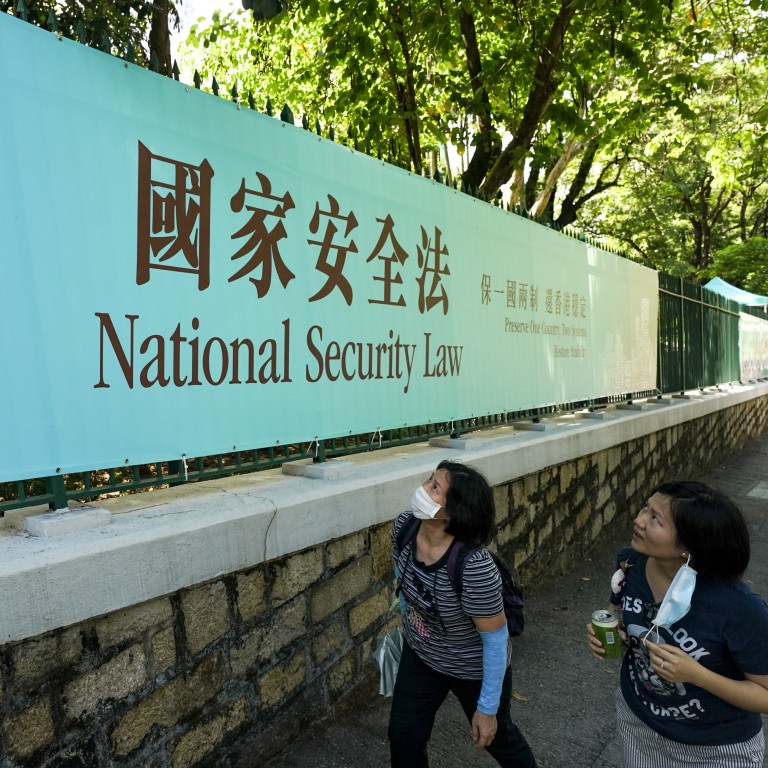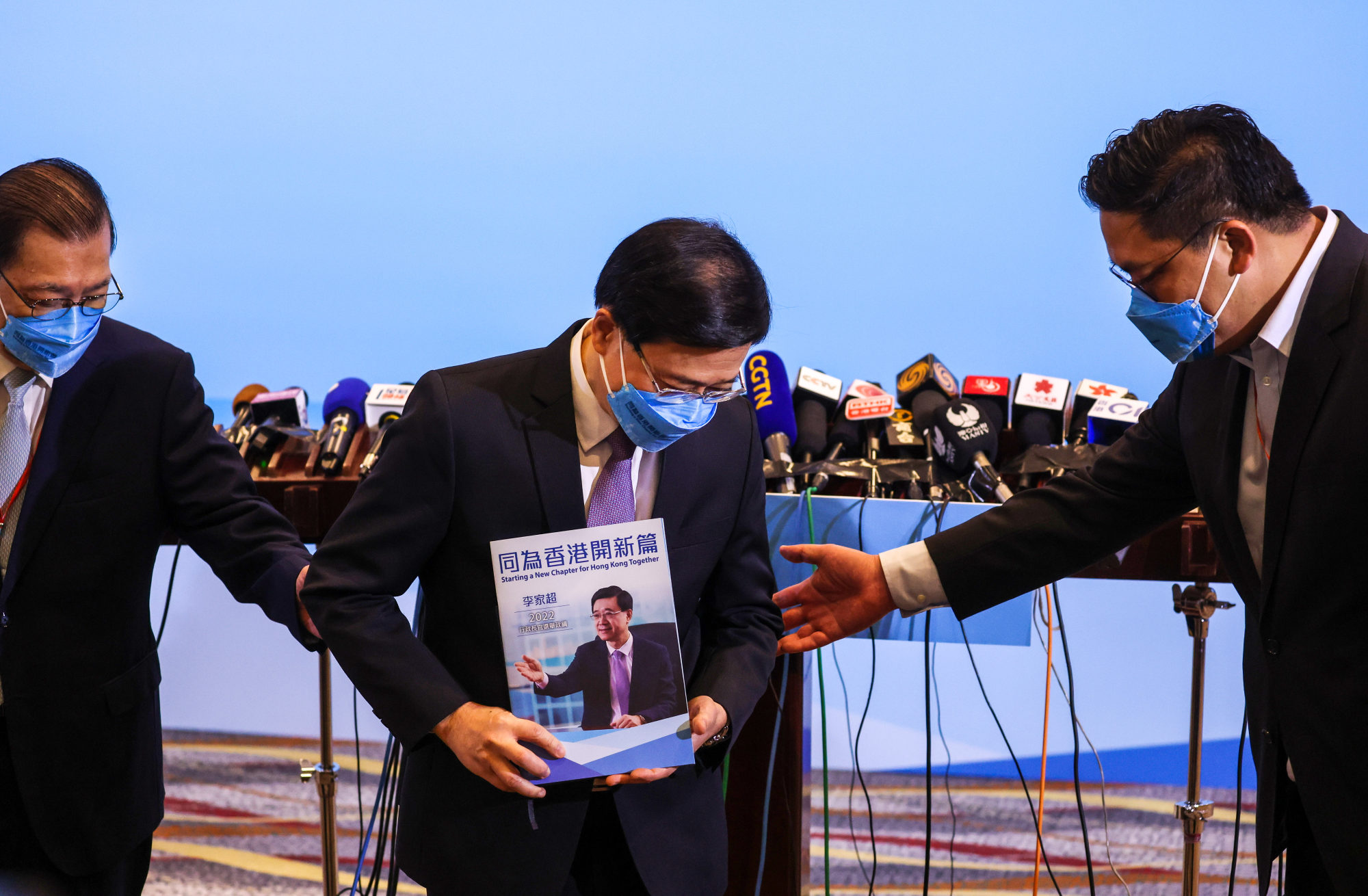
Beijing hits back at Britain over report on Hong Kong, calls it ‘a piece of waste paper’ that should be ‘swept into dustbin of history’
- Latest six-monthly UK report paints bleak picture of Hong Kong, claims Beijing is not complying with Sino-British Joint Declaration
- Beijing’s foreign affairs office in Hong Kong tells London to stop interfering in city’s internal affairs by claiming it has a ‘so-called historical responsibility’
Beijing has hit back at Britain over a parliamentary report that raised concerns over rights and freedoms in Hong Kong, calling it “a piece of waste paper” that has slandered the rule of law and should be “swept into the dustbin of history”.
In a statement on Thursday night, Beijing’s foreign affairs office in Hong Kong also urged London to stop interfering in the city’s internal issues by claiming it had a “so-called historical responsibility” under the Sino-British Joint Declaration, calling it “proof of the British colonial nostalgia and its obsession with political grandstanding”.
“Over the past quarter century, the legal basis for the governance of the Chinese government in [Hong Kong] is the Chinese constitution and the Basic Law of Hong Kong, not the Sino-British Joint Declaration,” an office spokesman said, referring to the city’s mini-constitution.
“No matter how grandiose the report looks, it is nothing but a piece of waste paper … Enough with the political game of the UK already, the report should have been swept into the dustbin of history long ago.”
The latest row was sparked by the release of Britain’s latest six-monthly parliamentary report on Hong Kong, which accused Beijing of failing to comply with the joint declaration – the agreement that paved the way for the city’s return to Chinese rule in 1997 – and suggested the national security law imposed by the central authorities had seeped into “all aspects” of life.
British Foreign Secretary James Cleverly on Thursday said the city’s rights and freedoms had been sacrificed to “facilitate greater control by Beijing”. He accused Hong Kong authorities of trying to censor critics overseas by resorting to the security law, which outlaws secession, subversion, terrorism and collusion with foreign forces.

Despite the claims, Cleverly said: “We will work constructively with the new chief executive where we can within the wider relationship, but we will judge the Hong Kong government based on its actions.
“We call on the chief executive to respect rights and freedoms in Hong Kong, and to uphold the rule of law. It is in China’s interests that Hong Kong maintain its distinctiveness.”
In a foreword to the 25-page report, Cleverly pledged Britain would “continue to support Hongkongers, including through the British National (Overseas) visa route, to live, work and study in the UK”.
He painted a bleak picture of Hong Kong under the national security law, writing that “Hong Kong’s autonomy was declining, and the pervasive, chilling effect of the national security law seeps into all aspects of society”.
Much of the report was dedicated to the arrest and jailing of opposition activists, the forced closure of “pro-democracy” media outlets and international rebukes over declining human rights.
Committee backs ban on overseas lawyers in Hong Kong national security cases
The victory of John Lee Ka-chiu in the chief executive election in May last year – the first leadership poll following the Beijing-led “patriots-only” electoral reform – was also said to have “reflected the continued decline in political plurality in Hong Kong”.
Cleverly argued the city’s judiciary was required to enforce laws and values imposed by Beijing, while authorities also used the antiquated offence of sedition to crack down on dissent.

He said the situation made it “untenable for UK Supreme Court judges to continue within Hong Kong’s judicial system”, explaining the resignation as non-permanent judges of Robert Reed, Patrick Hodge from the Hong Kong Court of Final Appeal last March.
Although the report covered the six-month period up to June last year, Cleverly also made reference to subsequent events in his comments and noted the interpretation of the national security law last month by Beijing.
“We will watch closely how the chief executive implements the decision,” he wrote.
The report concluded: “With the continued application of the [national security law] imposed on Hong Kong to harass and stifle alternate voices, and limits to political participation, there is no doubt that China remains in a state of ongoing non-compliance with the Sino-British Joint Declaration.”
Justice minister vows to defend Hong Kong’s legal system from ‘Western attacks’
The joint declaration, signed in 1984 between London and Beijing, set out the terms of the 1997 handover.
Chinese officials have referred to it as an “historic document” that had “completed its mission”, but the report reiterated Britain’s stance that it remained a legally binding treaty.
Meanwhile, Cleverly welcomed Hong Kong’s easing of Covid-related travel restrictions to “reopen Hong Kong to international travellers”.
In its rebuttal, Beijing said the report had smeared the national security law and the “patriots-only” electoral system, slandered Hong Kong’s rule of law and grossly interfered in the city’s affairs.
“The British side claims to uphold the rule of law, but in practice releases a so-called Hong Kong report every six months in which it plays the ‘judge card’, ‘BNO card’ and many other cards to interfere in Hong Kong affairs and damage the rule of law in Hong Kong,” the office spokesman said.
“The world has thus seen more clearly the hypocrisy and double standards of the British side.”
Beijing argued that the legislation and new electoral system had effectively safeguarded national security and social stability, as well as protected all lawful rights and freedoms of Hongkongers, providing international investors with a “a more safe, stable and predictable business environment”.
On Thursday night, the Hong Kong government also slammed what it called “slandering remarks” and “ill-intentioned political attacks” in the report.
The administration said it had been maintaining extensive ties and fostering cooperation with different countries in accordance with the Basic Law regarding Cleverly’s indication that the UK will seek to work constructively with Lee.
“[It] premises on mutual respect of the ‘one country, two systems’ principle and not to smear or slander the successful application of such principle nor interfere with the affairs of Hong Kong,” it added.


